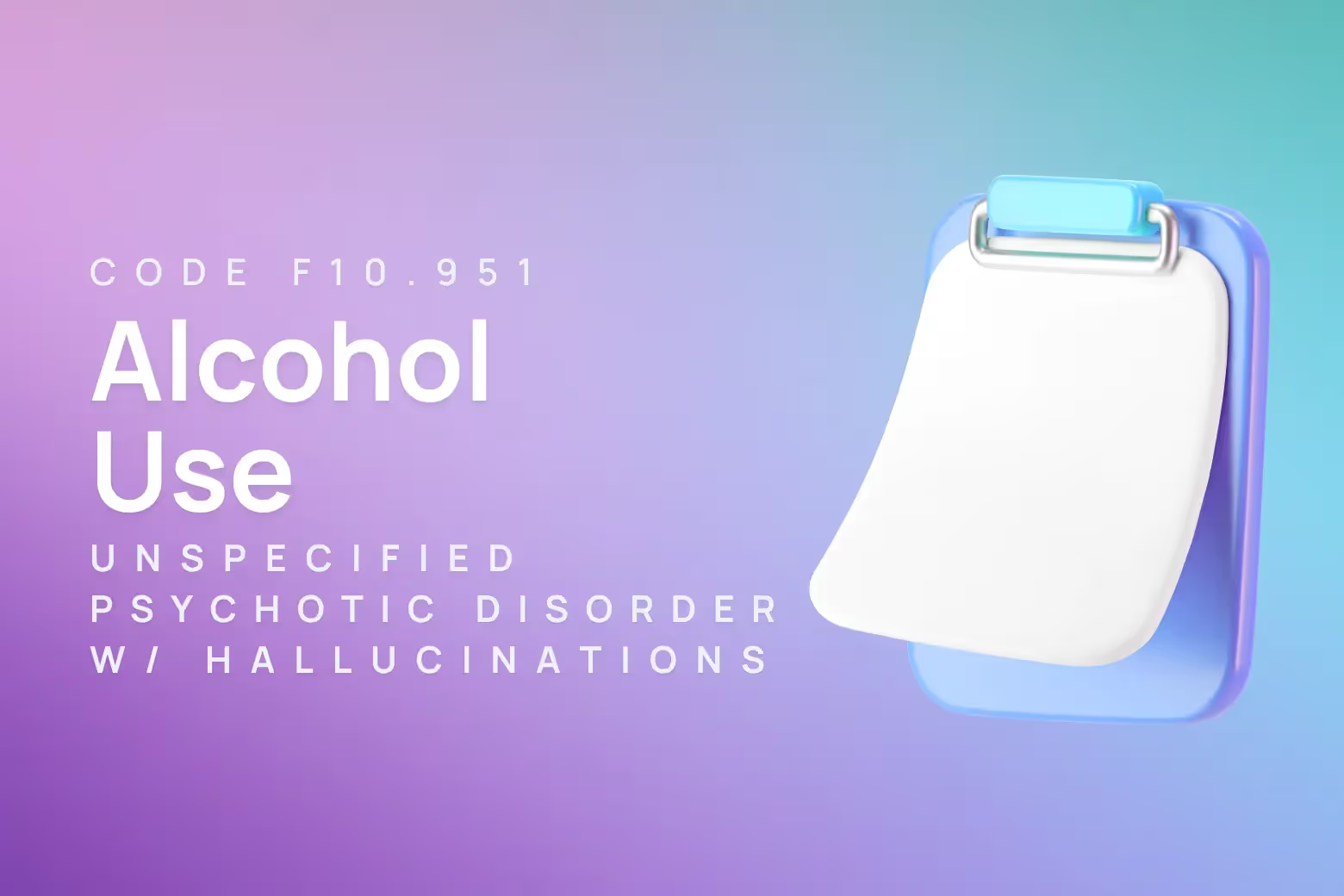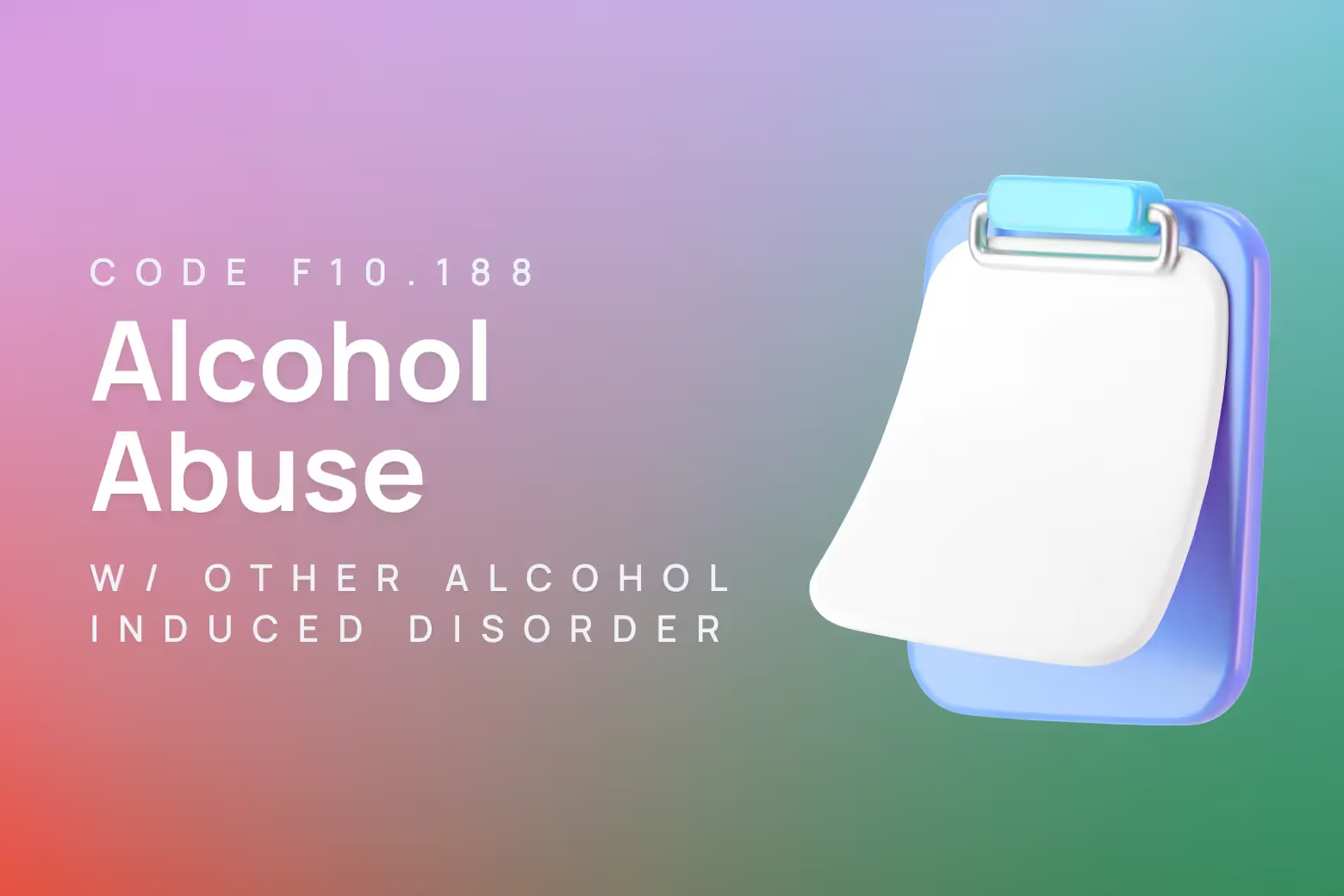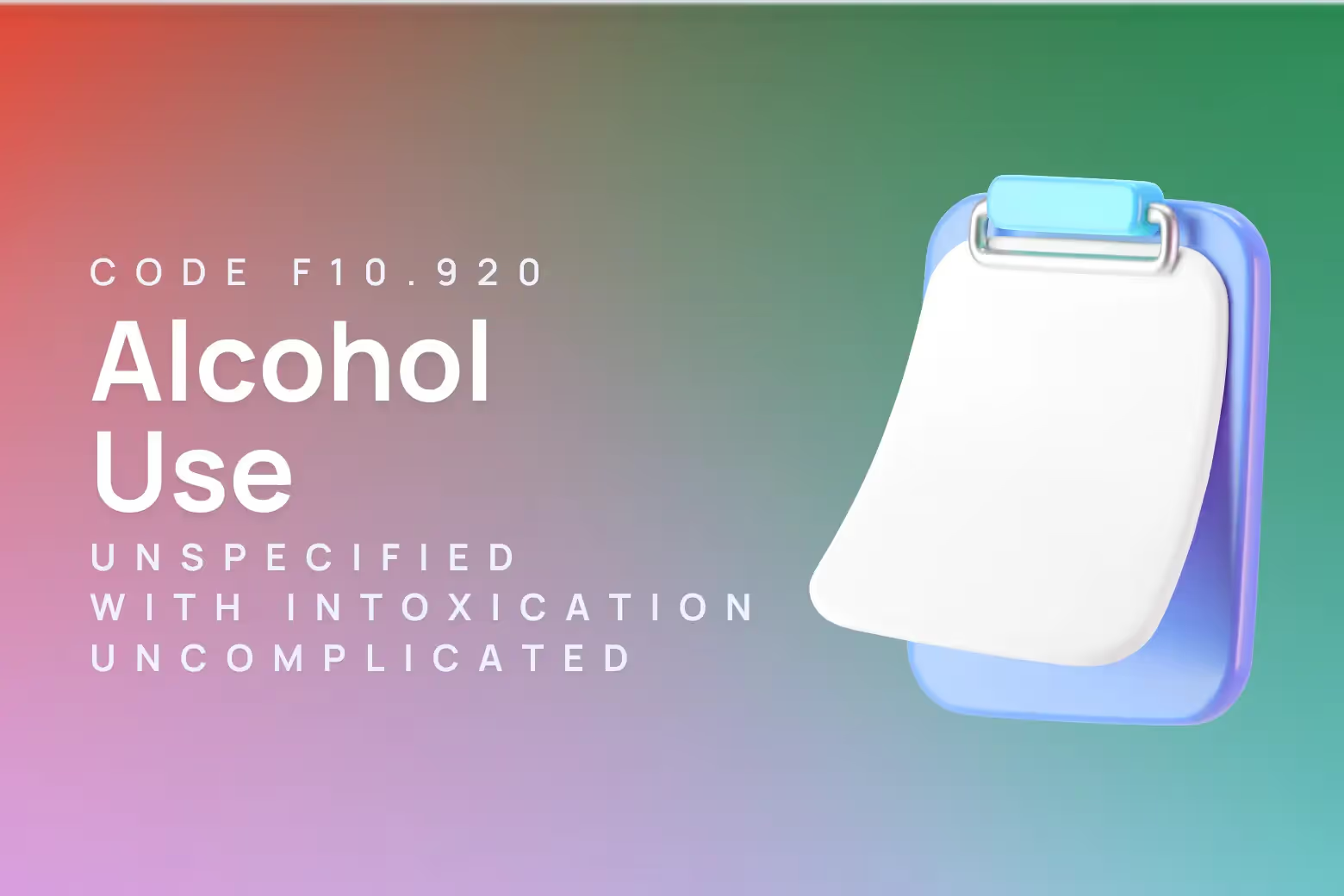ICD-10 code for alcohol dependence with withdrawal, uncomplicated

F10.230 is the ICD-10 code for alcohol dependence with withdrawal, uncomplicated.
This code specifically identifies clients who meet criteria for alcohol dependence and are experiencing withdrawal symptoms that do not include complications like delirium, seizures, or perceptual disturbances.
Accurate diagnosis coding ensures proper treatment planning and reimbursement for withdrawal management services.
Key features:
- Applied when alcohol dependence criteria are met along with uncomplicated withdrawal symptoms
- Withdrawal symptoms include tremor, sweating, anxiety, nausea, and sleep disturbance without severe complications
- Requires documentation of both dependence patterns and current withdrawal presentation
- Distinguishes from complicated withdrawal forms that involve delirium or perceptual disturbances

Diagnostic criteria for alcohol dependence with withdrawal, uncomplicated (F10.230)
Clinicians must establish the presence of both alcohol dependence and uncomplicated withdrawal to assign this code.
The dependence component reflects a problematic pattern of alcohol consumption leading to significant impairment or distress over at least 12 months.
Alcohol dependence diagnosis requires at least two symptoms from established criteria including:
- impaired control over use
- unsuccessful attempts to reduce consumption
- persistent cravings
- continued use despite negative consequences
Physical tolerance and withdrawal symptoms provide additional evidence of dependence severity.
Uncomplicated withdrawal presents as a constellation of physical and psychological symptoms without life-threatening complications:
- Autonomic symptoms: Sweating, rapid heart rate, elevated blood pressure, hand tremor, low-grade fever under 38°C
- Gastrointestinal features: Loss of appetite, nausea, vomiting, stomach upset, loose stools
- Neuropsychological symptoms: Poor concentration, anxiety, restlessness, sleep problems, vivid dreams
These symptoms typically emerge 6 to 24 hours following the last drink and peak during the first 48 to 72 hours of abstinence.
The absence of seizures, hallucinations, or delirium distinguishes uncomplicated from complicated withdrawal presentations.
When to use F10.230 diagnosis code
Accurate differential diagnosis helps clinicians distinguish F10.230 from related alcohol withdrawal codes and ensures appropriate treatment intensity. The presence of both dependence criteria and uncomplicated withdrawal symptoms guides code selection.
F10.230 vs F10.23 (Alcohol dependence with withdrawal)
F10.230 adds specificity by indicating withdrawal symptoms are uncomplicated. Use the more specific F10.230 when documentation clearly establishes the absence of severe withdrawal complications.
F10.23 serves as a broader category when withdrawal severity is not fully characterized.
F10.230 vs F10.231 (Alcohol dependence with withdrawal delirium)
F10.231 applies when withdrawal includes delirium tremens - severe confusion, disorientation, and altered mental status.
Clients experiencing delirium require immediate medical intervention and higher levels of care. F10.230 excludes these serious complications.
F10.230 vs F10.232 (Alcohol dependence with withdrawal, with perceptual disturbance)
F10.232 indicates withdrawal accompanied by hallucinations or perceptual disturbances without full delirium.
These may include visual, auditory, or tactile hallucinations while consciousness remains relatively clear. F10.230 specifically excludes perceptual disturbances.
Related ICD-10 codes
- F10.23 - Alcohol dependence with withdrawal
- F10.231 - Alcohol dependence with withdrawal, delirium
- F10.232 - Alcohol dependence with withdrawal, with perceptual disturbance
- F10.239 - Alcohol dependence with withdrawal, unspecified
- F10.20 - Alcohol dependence, uncomplicated
- F10.21 - Alcohol dependence, in remission
Interventions and CPT codes for alcohol dependence with withdrawal
Evidence-based treatment for F10.230 combines withdrawal management with longer-term dependence interventions. Initial care focuses on symptom relief and safety, while ongoing treatment addresses underlying dependence patterns.
Withdrawal management and supportive care
Initial treatment emphasizes symptom monitoring, supportive counseling, and medical supervision. Uncomplicated withdrawal can often be managed in outpatient settings with appropriate supports, though some clients benefit from residential detoxification services.
Relevant CPT codes include 90791 for comprehensive psychiatric evaluation to establish diagnosis and treatment planning. 90832, 90834, or 90837 cover individual psychotherapy sessions focused on withdrawal support and early recovery planning, with code selection based on session duration.
Motivational interviewing and engagement
Motivational interviewing helps clients explore ambivalence about drinking changes and builds motivation for sustained recovery efforts. This approach proves particularly effective during early recovery when clients may feel uncertain about treatment goals.
Use 90834 or 90837 for individual motivational interviewing sessions. 99408 or 99409 apply for screening and brief intervention services with commercial payers, while G0396 or G0397 serve similar functions for Medicare beneficiaries.
Cognitive behavioral therapy and relapse prevention
Cognitive behavioral therapy addresses thinking patterns, emotional triggers, and situations that contribute to drinking patterns. Coping skills training helps clients develop alternatives to alcohol use for managing stress, social situations, and emotional challenges.
Bill 90834 or 90837 for individual CBT sessions targeting alcohol dependence. 90853 covers group therapy focused on relapse prevention skills and peer support. 90847 applies when family members participate in treatment sessions.
Medication-assisted treatment evaluation
Some clients benefit from pharmacological support during withdrawal and ongoing recovery. Naltrexone, acamprosate, and disulfiram can reduce cravings and support abstinence goals when combined with psychosocial interventions.
90791 covers medication evaluation and psychiatric assessment. Follow-up medication management typically uses 90792 for brief sessions focused on medication monitoring and adjustment.
How Upheal improves F10.230 ICD-10 documentation
Clinical documentation platforms can significantly improve the accuracy and efficiency of alcohol dependence diagnosis coding while supporting comprehensive treatment planning.
Suggesting appropriate ICD-10 codes based on session content
Upheal's clinical documentation platform analyzes session notes and treatment discussions to recommend relevant diagnosis codes.
When clients describe withdrawal symptoms alongside dependence patterns, the system can suggest F10.230 as a potential code option. This AI assistance helps clinicians capture specific withdrawal presentations that might otherwise be coded more generally.
The platform recognizes clinical language related to withdrawal symptoms like "shaky hands," "trouble sleeping," or "feeling anxious" when combined with dependence indicators. This natural language processing supports more precise diagnostic coding.
Maintaining HIPAA-compliant records with proper diagnostic coding
Comprehensive documentation requires balancing thorough clinical records with privacy protections.
Upheal maintains secure, encrypted storage of sensitive alcohol treatment information while ensuring diagnosis codes align with documented symptoms and treatment plans.
The platform tracks withdrawal symptom progression over multiple sessions, helping clinicians document the course of uncomplicated withdrawal. This longitudinal perspective supports accurate coding and demonstrates medical necessity for ongoing treatment.
Reducing administrative burden so you can focus on client care
Manual documentation of withdrawal symptoms and dependence criteria can consume significant clinical time.
Upheal automates routine documentation tasks, allowing clinicians to spend more time on direct client interaction and therapeutic interventions.
The platform generates session summaries that include relevant symptom documentation, making it easier to support diagnosis codes during insurance reviews.
This comprehensive record-keeping reduces the administrative burden of prior authorization requests and treatment planning documentation.
Supporting clients with alcohol dependence and withdrawal
Clients experiencing F10.230 require both immediate withdrawal support and longer-term dependence treatment. The combination of physical discomfort and psychological distress during early withdrawal can challenge engagement and motivation for change.
Successful treatment often begins with psychoeducation about the withdrawal process and realistic expectations about symptom duration.
Most uncomplicated withdrawal symptoms resolve within a week, though psychological symptoms like mood changes and sleep disturbances may persist longer.
Building hope and providing practical coping strategies helps clients navigate this challenging period.
Ongoing care should address both biological and psychosocial aspects of dependence.
Regular monitoring helps identify clients who might benefit from residential treatment or more intensive support services.
Family involvement and social support networks often prove crucial for sustained recovery success.
Clinical documentation platforms like Upheal help clinicians maintain detailed treatment records while focusing attention on therapeutic relationships.
By automating routine documentation tasks, these tools support both billing accuracy and clinical quality.
Try Upheal's clinical documentation platform to see how AI assistance can improve your alcohol treatment documentation and client care efficiency.













